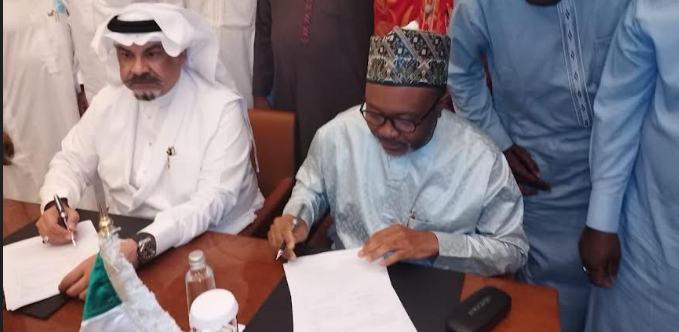The Chairman/CEO, National Hajj Commission of Nigeria (NAHCON), Malam Jalal Ahmad Arabi, on Sunday at the Hilton Convention Hotel, Jabal Umar, Makkah, Saudi Arabia, signed the 2024 Hajj agreement with Ithraa Al Khair Company.
The agreement, which was signed by the chairman of the Saudi Arabian company, Dr Ahmad Sindhi, on behalf of his company, contains details of service delivery expected from the group and the cost of each service along with penalties in case of violation by any party.
A press release signed by NAHCON Assistant Director, Public Affairs, Fatima Sanda Usara, made available on Monday to Tribune Online in Abuja informed that the signing of the agreement followed a careful survey of packages offered by other Mutawwif companies that met with the NAHCON team and others during the just concluded Hajj and Umrah exhibition in Jeddah.
Speaking at the brief signing event, Malam Arabi cautioned officials of the company to discharge their responsibilities to Nigerian pilgrims with all sincerity as contained in the pact.
He emphasized that NAHCON would be involved fully in monitoring service provision from the implementation of agreement to the end of execution.
Usara stated that the NAHCON helmsman said that this was the time to start the relationship between the Hajj Commission and the Mutawwif company afresh on fresh terms built on trust.
Arabi then called on Dr Sindhi to make sure that the errors recorded in the past did not happen again.
Responding, Dr Sindhi promised to continue with an open line of communication to fix any problem immediately before it escalated.
He assured of his company’s readiness for teamwork with the singular objective of serving pilgrims well, adding that working with NAHCON over the years has made the company smarter and better as well as put it in a position to always improve.
Usara informed that, unlike previous practices whereby families were known for playing host to pilgrims and looking after their welfare while the holy pilgrimage lasted, Tawafa establishments form key part of the modern Hajj operations.
“Beginning from time immemorial, Mutawwif job used to be a hereditary responsibility to pilgrims at a time when pilgrims used to stay in Makkah for months before commencement of Hajj proper. Particular Makkan families were known for this role generation after generation.
“Back then, the Mutawwif hosts would manage their pilgrims’ affairs from the time of arrival until departure. The families would keep the pilgrims in their homes, cook for them, wash their clothes, celebrate them among family and friends, and make them part of their special occasions.
“Each Mutawwif was assigned a certain number of pilgrims based on ability from 100 to thousands where there is capability.
“When it was time for Hajj rituals, the Mutawwifs would take their pilgrims to the holy sites to perform their rites. Their job was purely service to pilgrims free of charge.
“King Abdullaziz standardised the system into Mutawwif Establishments that provide good quality services to pilgrims. These establishments were later appointed by the Ministry of Hajj and Umrah to guide and serve pilgrims,” she stated
According to her, Mutawwifs had now been commercialised into companies with the task of pilgrims’ hospitality and charged with responsibilities of overseeing and organising local transportation, securing pilgrims’ camps in Masha’ir (holy sites at Mina, Arafat, and Muzdalifah) providing technological and manual security, catering services, sanitation, etc.
“Mutawwifs are required to have full knowledge of the roads of Makkah and the holy sites as well as the Hajj rituals,” she added.
In another development, Usara informed that countries with large numbers of pilgrims have been mandated to sign the Tafweej (group movement) Memorandum of Understanding.
The MoU, according to her, provided a framework that each country must align itself with on Saudi Arabia’s system of moving pilgrims in groups, especially during the five-day Hajj.
She further informed that NAHCON Secretary, Dr Rabi’u Abdullahi Kontagora, signed the MoU on behalf of the Commission.
